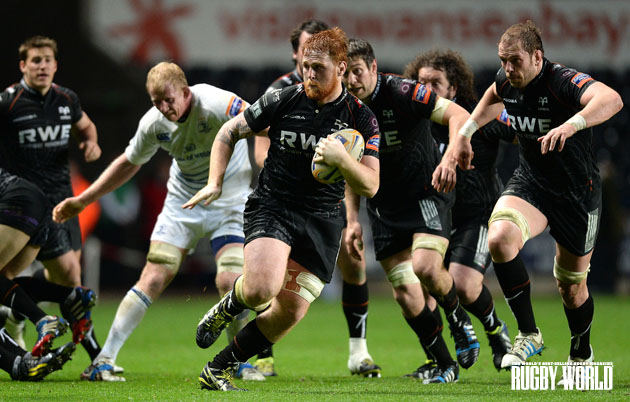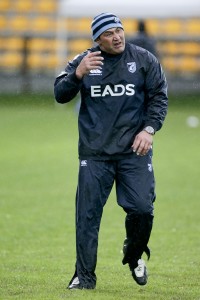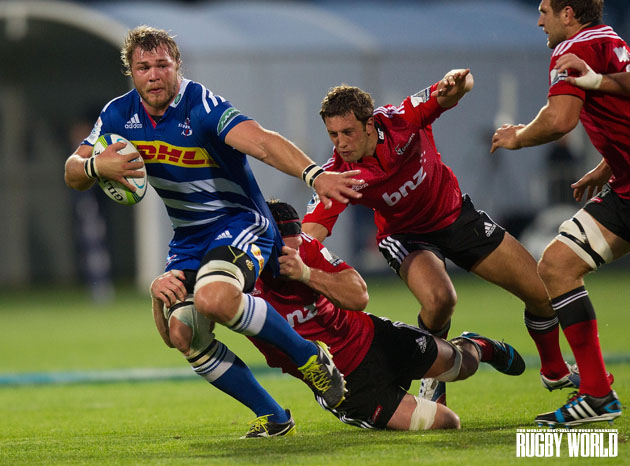Cardiff Blues turn a corner
April was a successful month for Cardiff Blues. Arguably their most successful period of the season. Admittedly the wins against Toulon and Ulster were highlights in their own right, but those victories were one-offs. April saw Cardiff Blues stitch together their first three game winning streak of the season. It may seem like an insignificant achievement, but it is gargantuan when viewed alongside the pre-Christmas performances. The three game winning-streak has validated the Blues’ decision to change their head coach and to appoint Dale McIntosh and Paul John, but the winning streak isn’t the only positive at Cardiff Arms Park. The return of Cory Allen has made an enormous difference in midfield. Allen’s triple-threat skill set of carrying, passing and kicking has brought a variation to the Blues backline that has thus far been missing.
Add to this the signing of Jared Hoeata and the reported hunt for Gareth Anscombe and Mark Hammett and the Cardiff Blues are moving in the right direction.
Silence between the WRU and the regions
April has seen very little movement between the WRU and the regions. In fact, the Eurasian tectonic plate has probably moved further during the last four weeks than negotiations between the WRU and Regional Rugby Wales. The silence is worrying. It’s like watching a failing marriage. We’ve witnessed the shouting stage, been through the screaming stage.
Now we’re in the bit where both sides have become so unhappy and devoid of care that the talking and even the plate throwing has stopped. The silence is aiding David Moffett’s campaign, whose constant presence on social media, and at his recent debate in Cardiff, is feeding people’s desire for solutions while they are seemingly unforthcoming from other bodies. Wales’ participation agreement ends in a matter of weeks and without it Welsh rugby will struggle to function. Unless the relevant bodies begin talking again, this divorce could get messy.
Dan Baker has arrived
Dan Baker has been threatening to genuinely break into Welsh rugby for the last 12 months. His performances for Wales’ U20s combined with a place on the senior tour to Japan looked set to propel Baker’s career earlier than it has. Injury put pay to that. But with those injuries behind him and a ‘highlight reel’ performance in April, Baker is finally fulfilling his potential.
He has an intriguing skill set. His ability to force defenders to set their feet and then step around or through the back of the tackle means that he regularly makes ten yard gains – and his desire to look for simple offloads is laudable. His emergence as a genuine ball-carrying No 8 is great news for the Ospreys who will soon need to find a replacement for Ryan Jones. Baker’s legitimate rise is also very good news for Wales, who will need two quality No 8s for the 2015 Rugby World Cup.
Openside issues for Wales
Wales have been very lucky during the past two seasons. Whereas many of the home unions are desperately scraping around to find a genuine test quality No 7, Wales have two. Both Sam Warburton and Justin Tipuric are legitimate opensides and their value to the Welsh squad has been enormous. However, April saw the possibility that Justin Tipuric may also miss Wales’ tour to South Africa along with Sam Warburton.
It is a big issue for Warren Gatland. Wales’ ball carrying is very direct and is becoming easy to read. Gatland relies on a ‘fetcher’ to make sure that easily read running lines don’t lead to even easier turnovers. However the injury situation may not be quite as gloomy as it first appears. Strangely, the Bok’s may be the easiest of the ‘Top three’ to face without a fetcher. Facing the mobile McCaw, Cane, Hooper or Gill would be a far more daunting task than the monstrous but less mobile, Vermeulen, Louw and Alberts. Getting to the ball first in South Africa may not be the biggest problem. Having the strength and size to remain ‘parked’ over the ball with 58st of Bok back row ‘clearing out’ may be a more pressing concern.
Swansea RFC. Relegated.
The issues that affect Welsh rugby aren’t merely affecting those at the top table. Welsh rugby is currently an ‘omni-mess‘– affecting all levels. None more so than the Welsh Premiership, where April saw Swansea RFC relegated. Founded in 1873, Swansea could now find themselves in the third tier of Welsh rugby. Of course this isn’t an issue that just affects Swansea RFC. Neath, Bridgend and Aberavon were all involved in the relegation battle and have equally rich histories.
The relegation of any of the aforementioned clubs would have been sad. Regardless of who was relegated the role of the Welsh Premiership needs to be redefined. Is it purely to feed players into the regions or to be a competitive league where the needs of the club takes precedence over the region above? Currently the role of the Welsh premiership is blurred. One thing that is clear though. Unless there is a significant U-turn from the WRU, Swansea RFC are going down.







